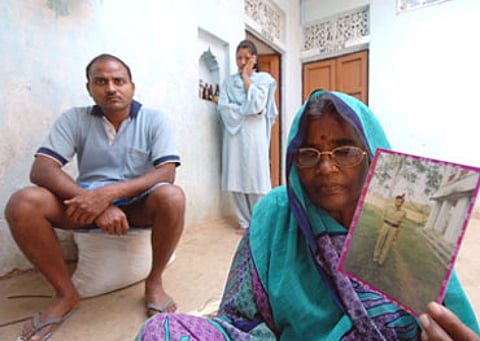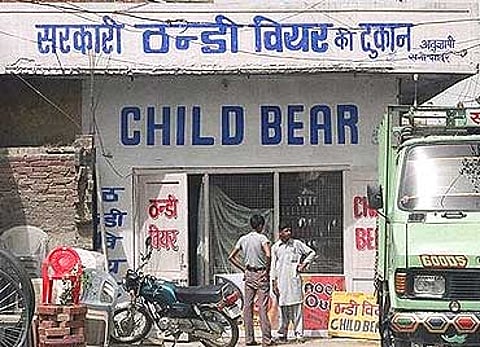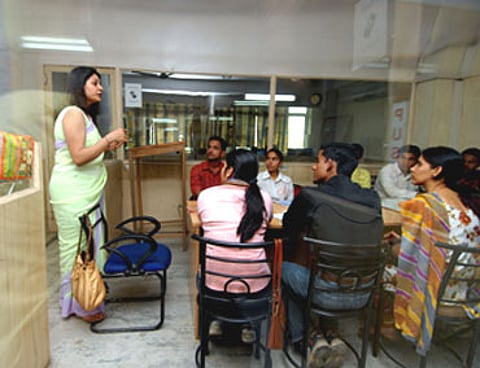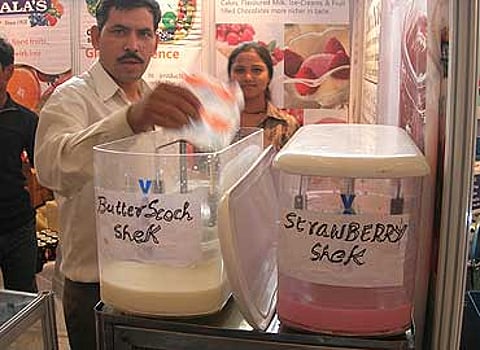English Speaking Curse
English is a source of anxiety, even despair, for its have-nots
- The British Council plans to train 7,50,000 Indian teachers in English over the next five years
- Narendra Modi is paying for 5 lakh young Gujaratis to learn English in time for Gujarat's golden jubilee in 2010
- A new English-teaching TV programme, Angrezi Mein Kehte Hain, is being launched on NDTV to cash in on the huge aspiration for English
- A Hyderabad-based company has announced plans to deliver a daily dose of English words and their meanings to mobile phones, so that Indians can improve their English vocabulary
- The Delhi government is teaching cabbies to speak English in time for the Commonwealth Games in 2010

***
Student who scored 100 in CBSE Class 12
English exam in e-mail to Outlook:
"It all depends on how one pen down the ideas....
The flow in the language helped me fetched marks."
***
***
Press release from a PR agency --
"I will be happy if you met Ray, his painting and his
thought. I have send you the invite prior."
***

Shortchanged: Infantile approach to teaching English helps none |
Some of the celebratory writing on English doesn't communicate how sharp those boundaries can be. In a piece hailing the coming-of-age of Inglish (English mixed with 'Indian') as both the "aspirational language of the lower and middle classes and the fashionable language of drawing rooms", columnist Gurcharan Das wrote: "One of the cheerful things happening in India is the quiet democratisation of English." Quoting language expert David Crystal ("If 100 million Indians pronounce an English word in a certain way, this is more than Britain's population - so it's the only way to pronounce it"), Das also speculated: Is Inglish our conquest of English?
Das's observations do capture a truth - we hear it all around us - but it's only a partial one. There are many worlds of English in India, and not all are blithely democratic. In the intensely desired world of BPOs, IT majors and MNCs, language gatekeepers are turning down all but a minuscule number of applying graduates. According to Uma K. Raman, head, Skills Enhancement, HCL BPO, her company rejects 92-93 per cent of applicants for poor English. Sandhya Chitale, director, Nasscom's Educational Initiative, puts the rejection rate for non-engineering graduates applying to the IT and IT-enabled sector, both in "voice" and "non-voice" roles, at 82-83 per cent, for lack of soft skills, including written and oral English. About 65-75 per cent of applying engineers are rejected for the same reasons.
***
popular English teaching institute--
Incorrect sentence : "Oh, he has the same car with yours?"
Incorrect sentence : "Let me check your pic again see
how is your beautiful eyes looks like. Ahha"
and see how beautiful your eyes look like. Haha"
***

"The curricula only emphasise reading and writing, not listening and speaking. You can't get a sentence out of a student who is asked to talk about himself," says Chitale bluntly. Raman declares written English even worse than spoken. "There is a myth that Indians are good at grammar," he says, "but they are only good at learning concepts - what is a noun, what is an adjective - not at applying them."
***
Tip from English teacher to Class 12 students --
"Keep the language simple and yet so crispy...
do not get deviate from topic."
***

In the Humanities section of one of the country's IITs, where English teaching is taken more seriously than in most engineering colleges, I hear the same conversation from a different perspective. Many new entrants to IITs struggle, teachers say, in communication classes. The demand for remedial English has grown, supply cannot keep pace. The expectation of students that English can be "learnt in a single day" to measure up to the global marketplace does not help. Many students have difficulty organising and expressing their thoughts in a coherent language structure. Ninety per cent of his students, says one teacher, would find it hard to describe a simple concept like evaporation in a couple of logically linked sentences. "They can give you points, but can't connect them," he said. The teachers make an important fundamental point, which I hear repeated, time and again, by teachers in other institutions. These problems have their roots in students being language-impoverished rather than just English-impoverished (that is, demonstrating a poor ability in regional languages too), and being virtually cut off from the humanities stream from senior school.
***
English writing abilities of school students
is poor, even in the country's top schools.
A 2006 survey (conducted jointly by
Wipro Applying Thought in Schools and
the organisation Educational Initiatives) among
Class 4-8 students in 134 top English medium schools
in the five metros found that 80 per cent of students
even in Class 8 make mistakes in
comprehension, grammar and syntax.
***
A smiling, red-lipsticked blonde woman painted on a board that lights up at night beckons some of these consumers to a "premium institution for spoken and advanced English" in a south Delhi colony. Sitting in on an 'exclusive' teaching session conducted by one of the thousands of MAs in English who have descended on the English teaching scene, I can see this is a power relationship. The teacher is omniscient, even if she says "Gayatri is going to expose more to foreign buyers" while explaining why her student, who works in an export unit, needs to improve her English. The students, Gayatri and Anish - a young contractor who supplies marble and needs better English to work on a big Indian construction company's project in Singapore - are eager but diffident. They pay around Rs 2,500 a month for lessons. A dubious-looking Hindi-English guide is being used. Course materials lying around the "premium institution" turn out to be stuff the proprietor "burnt nights", as he puts it, printing off the Net. What he's got together is truly nightmarish: a mish-mash of definitions of auxiliary verbs, hackneyed proverbs (man proposes, god disposes), American "slangs" and "jargons" (airhead, hunk, chocoholic), tongue-twisters, teaching exercises that seem to have been written for Chinese students, with references to common Chinese errors. American English is the place's forte, I am told, and a class could begin, says one teacher, by her walking in and saying, "Hi dudes and dudettes".

That's the home-made English academy, at the opposite end of the market from the superior language courses sold by the British Council for around Rs 9,000 per two-month term of instruction, and there are different shades in between. The clamour to sell English to millions of eager India buyers - individuals, corporate houses, state governments - is growing. While "academies" are advancing into tehsil towns and pockmarking hill stations with their boards, UK language schools are eyeing the Indian market.
***
Rejected For Poor English: 82-83 per cent
of non-engineering graduates applying to
the IT and IT-enabled sector and 65-75 per cent
of applying engineers are rejected for lacking
soft skills, including written and oral English fluency.
***

What the experts seem to be saying is that you have to grow it, with some dedication, through the education system. Parents across the country, desperate to advance their children's futures in a world of English, know that.
Tags